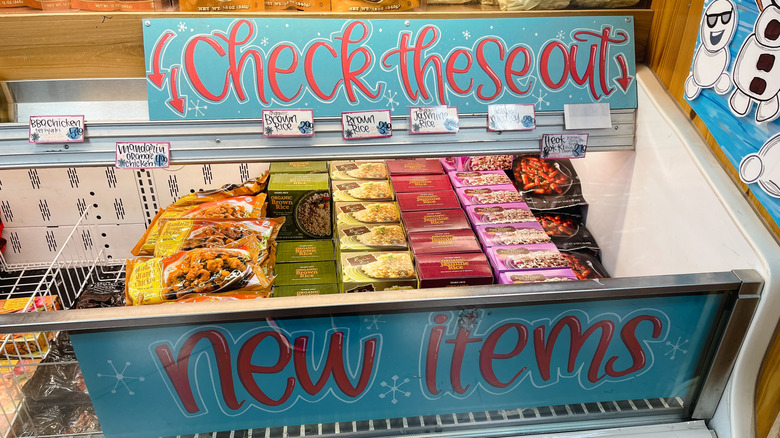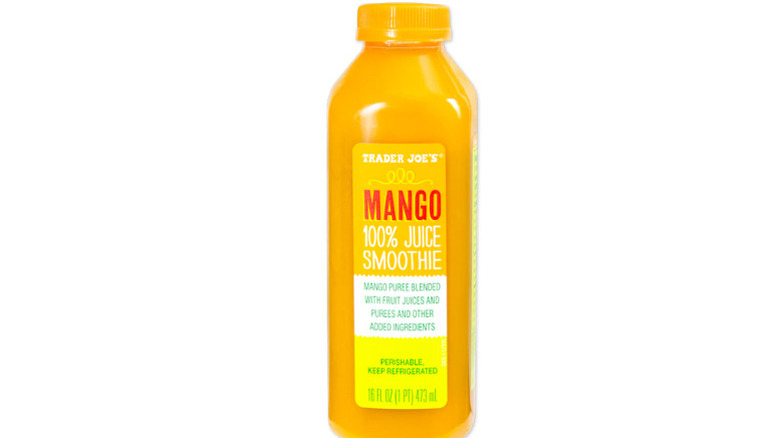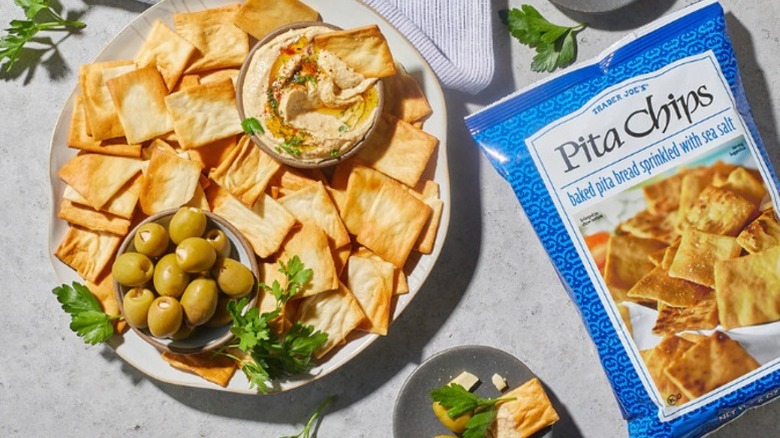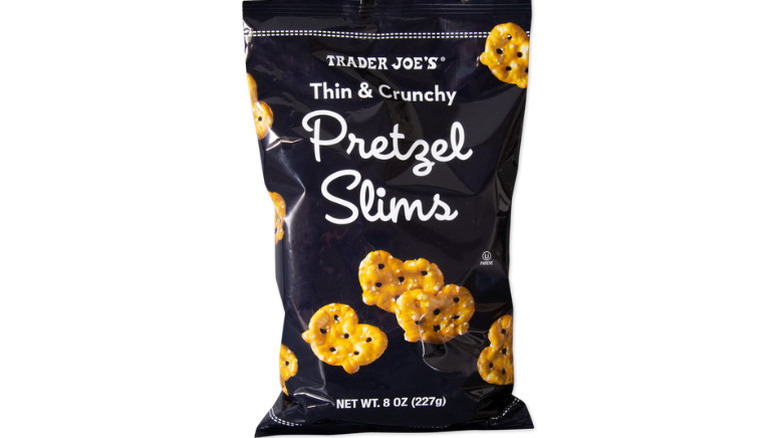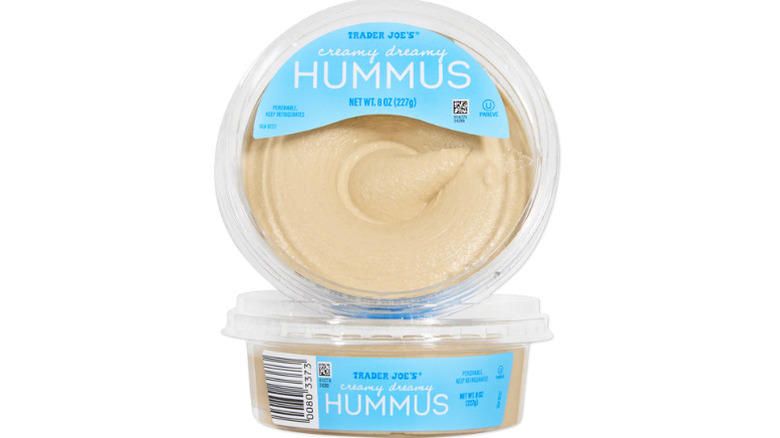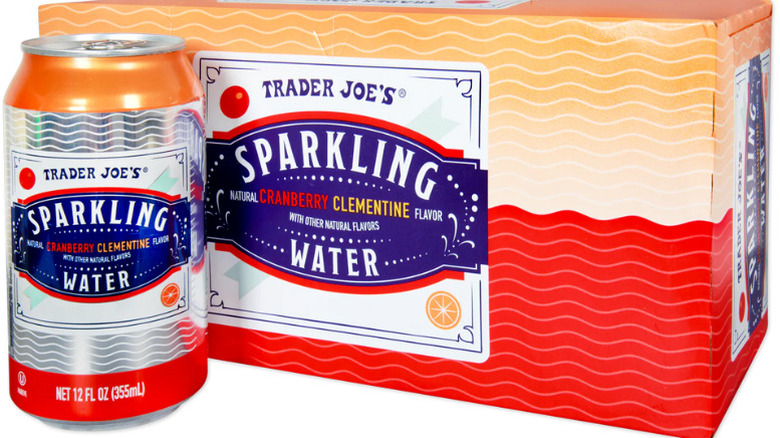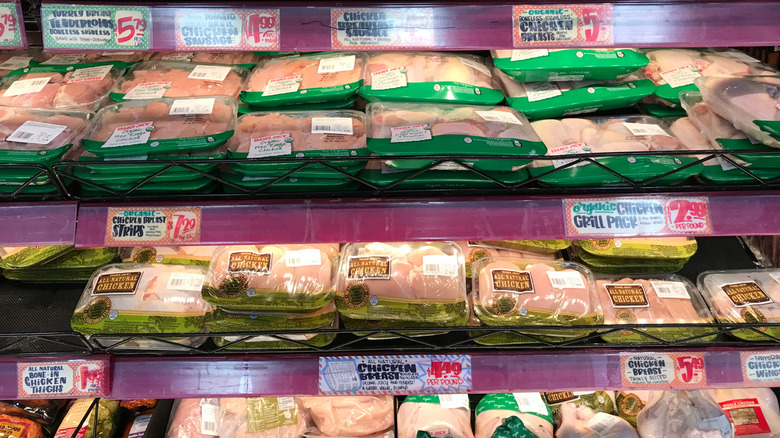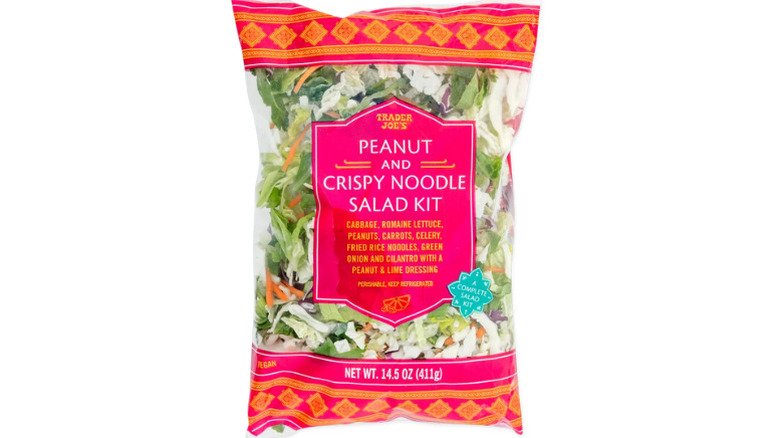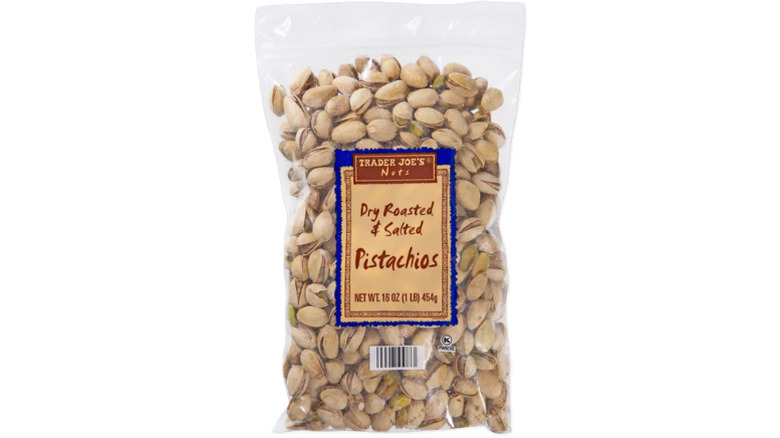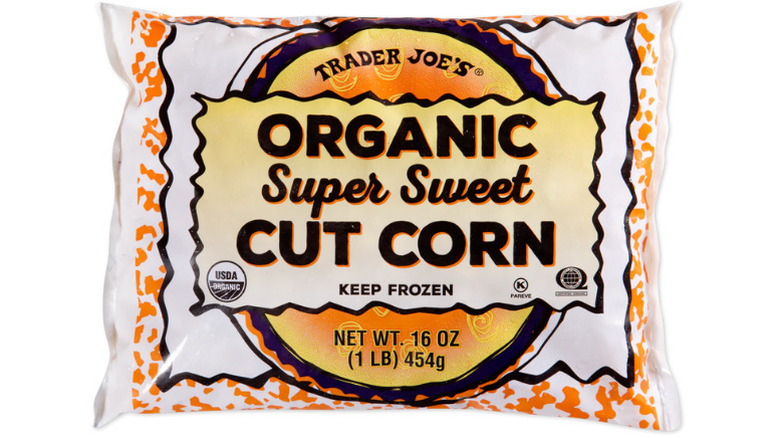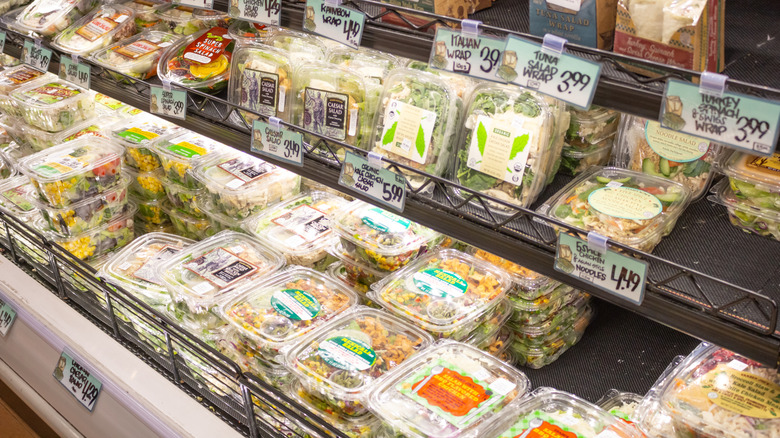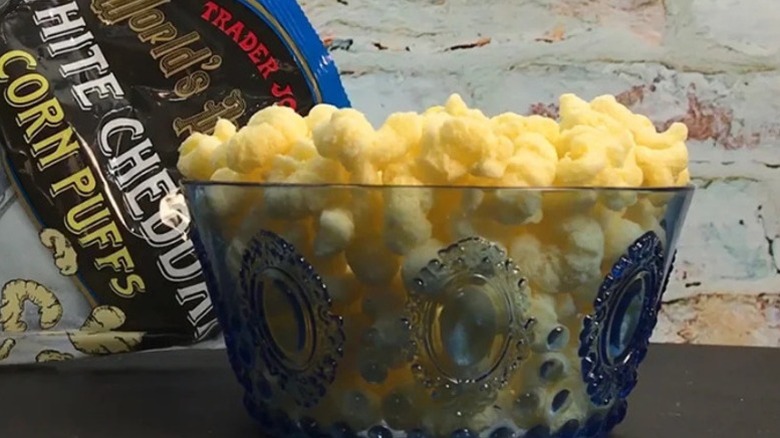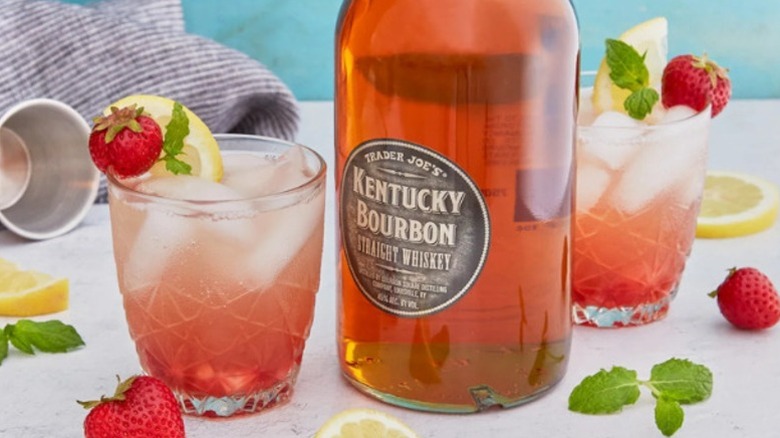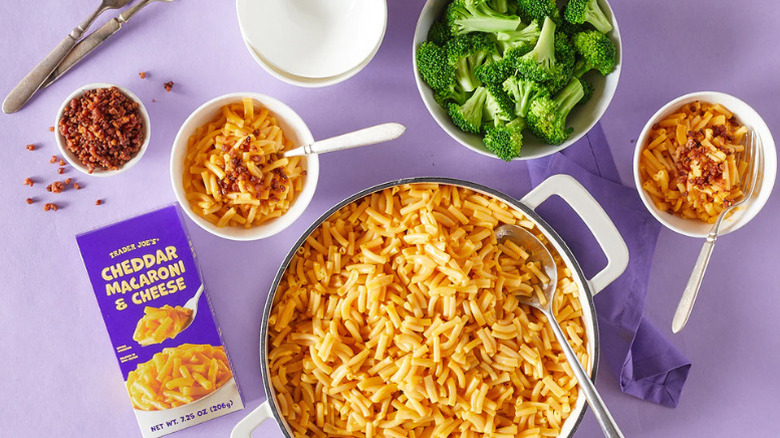13 Big-Name Brands Shoppers Suspect Are Hiding At Trader Joe's
After Hawaiian shirts, is there anything Trader Joe's is more famous for than private-label foods? One of the great joys of making a Trader Joe's run is planning out what sorts of snacks, prepared wraps, or freezer meals you're going to get — and don't forget frozen treats for the kids too! The grocery chain's proprietary products are a huge draw, but are some items on the shelves secretly big-name brands in disguise? In many cases, we can't know for sure. Trader Joe's doesn't disclose brand partnerships. Most brands aren't in the habit of letting customers know that they can go buy the exact same product cheaper elsewhere, if only they're willing to put up with ringing bells and chatty cashiers. Still, rumors persist about some products, and the evidence is compelling.
We're not saying that every Trader Joe's product is a lie. This is a company that's made itself an indispensable part of Christmas, with the mysteriously creative Jingle Jangle tin. We're not trying to take anything away from that. Still, many of the products sold are not pure originals. Here are a few of them.
1. Naked Juice
Sure, smoothies in general have similar ingredients sometimes. The thing is, though, Trader Joe's Mango 100% Juice Smoothie and Naked Juice's Mighty Mango have nearly identical ingredient lists. The previous iteration of TJ's Very Green Juice Smoothie had the same ingredient list as Naked Juice Green Machine. At a certain point, you start thinking about Occam's Razor, and signs point to Naked Juice making Trader Joe's smoothies.
To hear hosts Matt and Tara tell on the "Inside Trader Joe's" podcast, the grocery chain's practice of slapping its name on a product is a matter of boosting customer trust. While a store brand might usually be expected to be slightly lower quality than a national brand — apologies to Thor, but Dr. Thunder is no Dr. Pepper — Trader Joe's wants customers to feel like the private label is a mark of quality. From there, TJ's doesn't have to spend money on things like flashy packaging or advertising campaigns for each product. You're already in the store, buying the products. Saving on behind-the-scenes stuff allows the store to sell items at a lower price point. That's why a TJ's Mango 100% Juice Smoothie is $2.99 for 16 ounces, whereas a Naked Juice Mighty Mango sold at a major grocery chain is $3.99 for 15.2 ounces.
2. Stacy's Pita Chips
Same taste, same shape — some evidence is just intuitive. Trader Joe's Pita Chips and Stacy's Pita Chips partnership cannot be 100% confirmed, but that doesn't stop speculation from running rampant. If there is no partnership between the brand and the grocery chain? Well, that hasn't stopped TJ's from rolling out copycat products before.
As soon as the deliciousness of frying tortillas into chips was discovered, all other carbs should've been on notice. It was only a matter of time before people figured out pita chips. Stacy's started as a food cart in Boston in the 1990s, selling pita sandwiches, where Stacy Madison would fry leftover bread into chips to hand out to customers in line. However, many years later, Madison's humble street cart has morphed into a multimillion-dollar business, with Trader Joe's also selling her product. Or, if not Stacy Madison's product, then a product very much inspired by her.
3. Snack Factory
Trader Joe's calls this item Pretzel Slims. Snack Factory calls this item Pretzel Crisps. The average consumer calls them the exact same thing. If you're at a party and you see those flattened-out pretzels, that's what we're talking about. Is Snack Factory responsible for the Trader Joe's product? People seem pretty convinced, and it's hard to deny the evidence of your eyes and ears.
In fairness, some sort of shape modification for the pretzel was overdue. For too long, it came in two shapes: The soft pretzels you get at a stadium or fair, and old reliable, Rold Gold. Hardworking Americans deserve more pretzel choices. Especially since Snack Factory's Crisps and Trader Joe's Slims are so much better for holding a dip. Once you sink one of these into some hummus and taste the ratio of crunchy pretzel to smooth dip? You'll never go back to plain old Rold Gold. Whether or not Snack Factory is double-dipping and supplying TJ's, we can at least agree that the pretzel crisp/slim is a welcome addition to the snack market.
4. Tribe Mediterranean Foods
There have long been rumors of Trader Joe's stocking hummus made by Tribe Mediterranean Foods. A recall order in 2015, brought on by an undeclared potential allergen, revealed this speculation to be true. We couldn't find evidence that anything has changed since then. If you review the ingredient lists for both Tribe and Trader Joe's products, they're essentially the same.
The fact that Tribe is likely making Trader Joe's hummus did not stop one poster on Reddit from ranking Tribe ninth and TJ's first in a personal taste test, with a commenter even chiming in to point out that the two were likely the same. The fact that someone could have such a divergent taste experience with the two products is fascinating. Marketing expert Lisa Gansky once said (via Virgin), "A brand is a voice and a product is a souvenir," and that aligns with some of Trader Joe's motivation to use private label products. The grocery chain wants you, the customer, to associate products on the shelves with Trader Joe's, not whoever is making the product. Trader Joe's uses its voice, and you come home with a souvenir. Pretty good deal for TJ's reputation as a taste maker, and a pretty good deal for your wallet, too. Tribe's product sells for $4.19 for a 10-ounce tub, whereas the TJ's version is $2.49 for an eight-ounce tub.
5. Polar Sparkling Water
Sparkling water has been having a moment for many years now. Despite the fizzy water having a reputation for subtle flavor, people are still fiercely loyal to different brands. If you, like some others, are so loyal to Polar that you consider buying Trader Joe's brand on par with infidelity? Please don't worry yourself. There's ample evidence that Polar and Trader Joe's sparkling water are one and the same. For one thing, sometimes Polar bottle caps have ended up on Trader Joe's bottles by mistake.
We're not done finding clues yet, either. There's more evidence, and we're not just talking about the conspicuously similar package designs. As some people have speculated that Polar makes Trader Joe's sparkling waters, others have pointed out that many of the seasonal flavors for both brands are similar, and come out at the same time. So if you are brand loyal to one of these bubbly waters, put your label prejudice to rest. The only difference between the two is what flavors are being offered. Oh, and the fact that Polar can run you as much as $4.99 for eight cans in some stores, while Trader Joe's will charge you $3.49 for the same amount. That's one pretty undeniable difference.
6. Perdue
Here's one episode that Trader Joe's wishes it could keep under wraps: Some of the chicken on TJ's shelves comes from Petaluma Poultry, a subsidiary of Perdue. This came to light for many people when animal rights activist Zoe Rosenberg was arrested for breaking into a facility owned by Petaluma Poultry; Rosenberg and other activists have been urging Trader Joe's to stop selling chicken that comes from what they view as an abusive factory farm.
There's no part of factory farming that's pretty. If you see a bunch of living, breathing chickens,= packed in such cramped quarters that they cannot even stand, simply waiting to be slaughtered? It makes you rethink tonight's buffalo wings. If an animal rights activist on TikTok shows you a deformed, scarred chicken? It makes you queasy about the sandwich you had at lunch. That all said, there is also no grocery chain in the United States of America with clean hands when it comes to factory farming. Trader Joe's certainly has scandals, plenty of them gnarly and unsettling. This episode, revealing Perdue's practices with the chicken that ends up on Trader Joe's shelves, is another puncture in the chain's friendly, floral-shirted hippie image. Still, if you eat meat, the alternatives are few and far between.
7. Taylor Farms
Every grocery chain worth patronizing has a good selection of salad kits. Are they all secretly the same salads, though? The similarities between Taylor Farms and Trader Joe's private label salads have not gone unnoticed by shoppers. The labels look a lot alike, and the ingredient lists for Taylor Farms' Dill Pickle Chopped Salad and TJ's Dill-icious Chopped Salad are remarkably similar. Like smoothies, it's easy for salads to have the same ingredients due to sheer coincidence, but it's hard to imagine two nearly identical dill pickle salads being the product of parallel thinking.
The thing about salads is they're not hard to make. What's difficult about making a salad at home is having every ingredient you need on hand and fresh when you need it. Salad kits solve this problem. Of course, you, the consumer, have to sacrifice some creativity in exchange for the convenience of an all-in-one bag. You're eating what some big company has decided would be a tasty salad. There are only so many of those that make sense to mass produce and stock on grocery shelves. In that sense, is it such a big deal if Taylor Farms makes Trader Joe's kits? Besides, if you're starting to feel like every store offering is the same, then why not try some of our favorite salad and dressing recipes?
8. Wonderful Pistachios
The brands that Trader Joe's partners with are kept secret, but a 2016 Salmonella outbreak and its resulting recall revealed that Trader Joe's and Wonderful Pistachios are in cahoots. There's no boutique pistachio orchard behind Joe's house or anything like that. Hey, times of crisis reveal people's true colors, and since the U.S. Supreme Court has ruled that corporations are people, that maxim must apply to corporations, too.
Partnering with a major pistachio brand to supply your grocery chain with pistachios makes all kinds of sense. Nuts are a tricky thing to farm. Pistachio orchards are expensive. They require a very warm climate and access to plenty of water, and farmers often don't see a high yield for pistachios until seven or eight years after planting an orchard. Despite these challenging conditions, the U.S. has become the top pistachio-growing country in the world. The high costs and difficult infrastructure of farming the nut, however, mean that almost every pistachio on a grocery store shelf comes from The Wonderful Company.
9. ConAgra
This is another big brand exposed by a recall. During a 2016 Listeria outbreak, Trader Joe's Organic Super Sweet Corn was taken off the shelves by ConAgra, revealing the brand's partnership. When you think about things, it's not hard to understand why a supermarket would need to source a basic freezer staple from another company. Joe is not in the back somewhere, tending to the corn crop. Still, it lessens the perception of Trader Joe's as some kind of independent institution, distinct from the Safeways and Krogers and Ralph's of the world. Go back far enough in the production process, and it's all the same food.
Working in league with a massive conglomerate like ConAgra should dispel any residual myths of Trader Joe's being a store for the little guys. Sure, TJ's prices are easy on your wallet, but this grocery chain is not your quirky neighbor who always smells like incense and listens to Erykah Badu. Trader Joe's is still a business. A big business. Does that change the way frozen corn tastes? Only if the corn is carrying Listeria, we suppose.
10. McCain
McCain is one of those big food companies that you don't always realize you're buying from. Another outbreak of Listeria, this time in 2018, forced McCain to recall some foods, and a few of the items on the recall list were Trader Joe's salads and wraps. There's another company layered between McCain and TJ's, though: The salads and wraps were made by Mary's Harvest Fresh Foods, and were only recalled because the items contained corn from McCain. This one is a real peek behind the curtains into the contemporary food production chain.
If you still harbored any illusions about Trader Joe's being a creative entity, rather than the supermarket version of a magpie, this entry might be a little disappointing. It's fun to imagine a big test kitchen in the back of TJ's, with a dedicated team of sandwich artists crafting the perfect individual chicken salad wrap. In reality, companies like Mary's Harvest save the supermarket chain money, and then food supplies like McCain are so omnipresent that it boggles the mind. McCain has boasted before, that it's responsible for one in four French fries consumed globally. The scale of that production is almost impossible to imagine. The result is Trader Joe's relying on Mary's Harvest for wholesale pre-packaged products, and Mary's Harvest relying on McCain for huge amounts of one ingredient. It takes a lot of work to make a little bit of food. Unfortunately, when something goes wrong in these elaborate production chains, it's the consumer who feels the effects.
11. Pirate's Booty
Either Pirate's Booty is making Trader Joe's World's Puffiest White Cheddar Corn Puffs, or the copycat department at TJ's has gotten really, really good. That crisp, airy texture! How satisfying it is to crush one by pressing it between your tongue and the roof of your mouth! The cheese dust getting filmy on your fingers! The only difference seems to be that Pirate's Booty is made with rice flour and cornmeal, whereas Trader Joe's cheddar puffs use cornmeal only. Maybe you can taste the difference, maybe you can't. The point is you can have that cheese puff experience with Pirate's Booty at $7.99 for 10 ounces. Alternatively, you can buy the Trader Joe's version for $2.69 for seven ounces.
Pirate's Booty might have simply hit on something the zeitgeist had been craving when the snack hit the scene back in 1987. Another inexpensive knockoff is Aldi's white cheddar puffs. If your kids (or you) can't tell the difference, then why buy the name brand? It also makes sense, then, that Pirate's Booty would contract their services out to make a Trader Joe's product. Obviously, we wouldn't know the exact details of such an arrangement, but we have to imagine that the big-name brand wants at least some say in the final Trader Joe's private label product.
12. Buffalo Trace
Is Trader Joe's Kentucky Bourbon actually a sneaky way to get Buffalo Trace for a lower price? The rumor has been swirling around for a while. The answer, it turns out, is a definitive: Sometimes. The brands that make Trader Joe's liquor and beer are frequently changing. Sometimes, the whiskey is made by Buffalo Trace, and sometimes the whiskey is made by Barton. When Trader Joe's rolls out a new seasonal liquor, buying a bottle might be something of a gamble, but it's also an opportunity. You get to try a new type of booze, without any of the baggage of label prejudice. That's exciting!
Maybe you're intrigued by the possibility of paying TJ's comparatively low prices for the possibility of a high-end bourbon like Buffalo Trace. Conversely, maybe you're worried about getting the exciting new TJ's liquor, only to find it's a brand you don't like. That uncertainty is part of the game when shopping in the Trader Joe's alcohol department. You're not getting old reliable Jack Daniels or Bud Light on those shelves. You are, of course, getting something that Trader Joe's thinks you ought to sip.
13. Annie's
It's long been rumored that Trader Joe's mac and cheese is made by Annie's, given the similarities between the two boxed pastas' packaging. They definitely taste similar, and both of them taste noticeably different to Kraft's blue box. When pressed, Annie's put those rumors to bed in a 2021 statement to SFGate, saying, "We only label our products as Annie's." So there you go, case closed, moving on. Or is it that simple?
Of course, there's corporate wiggle room in that statement. Does Annie's make another product that it doesn't consider one of its own, that then gets a Trader Joe's label slapped on it? Annie's might only label Annie's products as Annie's, but the whole point of the private label is that the product becomes Trader Joe's. Who knows, maybe we're getting too conspiracy-brained. At any rate, some TJ's shoppers remain unconvinced that the two products are different. That will probably be the case as long as the boxes look the way they do.
